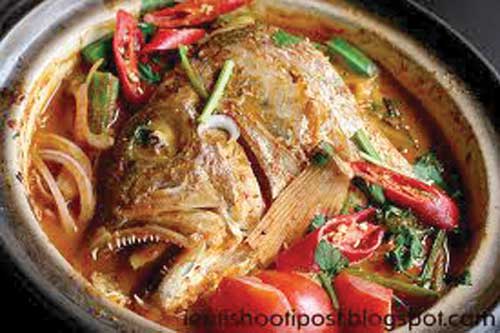.jpg)
.jpg)
and some Yemenite influences from Rayzel Yaish
As a child on Rosh Hashanah in my home, we ate pomegranate and new fruit as is customary to symbolize our wishes for the upcoming year. However, as my husband and I began developing our own family customs, we were drawn to the idea of eating symbolic foods that express our hopes and aspirations for the New Year. Called simanim or signs, each bite represents a hope and prayer for a happy, healthy and safe new year for us and the Jewish people. Different foods are used by different cultures, and there are many different customs as to how the foods should be prepared.
Here are some of the simanim that my family enjoys:
A fish head. I poach the fish head in a pot of salted water. We each pick out a sliver of fish to eat, enthusiastically hoping that in the coming year we will be “heads” in our life and not “tails!”
Carrots. I prepare a traditional sweet tzimmes recipe, but also serve some plain baby carrots for those of my children that are purists! This is a hope for increased merit in the coming year.
Beets. I dice them, sprinkle with olive oil and salt, and roast at 400 for about 45 minutes. This is a prayer to decrease the power of our adversaries.
Here are some from Rayzel’s husband’s Yemenite tradition:
Black Eyed Peas/Beans. I buy a can or two and warm the beans with salt, a sprinkle of cumin powder and black pepper. These are called Rubia in the Yemenite tradition from the root word meaning many. When we eat these we say a Yehi Ratzon that our merits should multiply and be many!
Leeks. My Yemenite family crunches these raw. For me they are too bitter. I sauté two or three leeks, the white and light green parts in olive oil then mix them with two eggs, ¼ cup matzo meal, and salt and pepper. Then I let that mixture sort of fry in the pan like one big latke. This latke is cut into wedges and served. When we eat these Karti in the Yemenite tradition from the root to erase or cut off, we are hoping that any obstacles or enemies be they internal or external get cut off or erased!
Chavie Hagler and Rayzel Yaish are two Bergen county based full-time working mothers who have a passion for delicious food! We are delighted to bring you Over the Kosher Kitchen Sink. In the column, you will hear us schmooze “over the kosher kitchen sink” about kosher food trends, preparing for the Jewish Holidays, cooking for ourselves and our families and friends, food preparation and presentation, new and exciting local kosher developments, and in general our musings about anything and everything related to kosher food and cooking!
In the spirit of friends and family who we hope enjoy hanging around and chatting over our kitchen sinks, we hope you will enjoy our tasty thoughts and will share your questions and kosher food ideas with us at kosherkitchensink_jewishlinkbc.com
By Chavie Hagler








